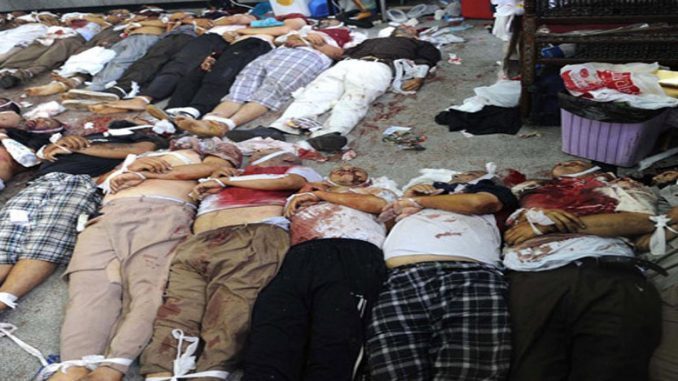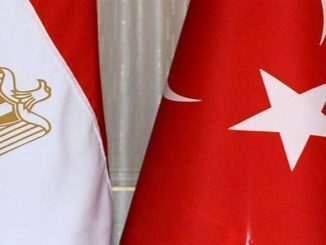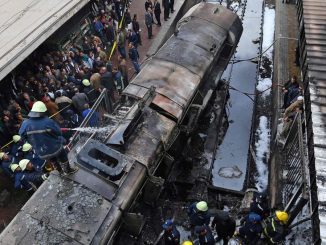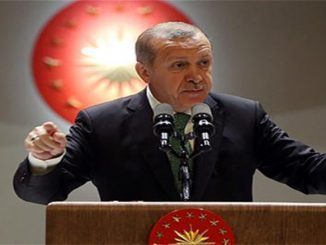
“In summer 2011, I played my last intramural football game as a senior at Ohio State University. Two short years later, I found myself running, not from would-be tacklers, but for my life, from an army deployed to kill its own people. Five years ago on Aug. 14, the Egyptian army perpetrated one of the world’s largest killings of demonstrators in a single day in recent history, mercilessly gunning down more than a thousand civilians. I survived, only to spend the next 22 months in an Egyptian prison, where torture, brutality and sadism were the hallmarks of day-to-day existence,” said Mohamed Soltan introducing an article he published in Washington Post.
Soltan continues his article as follws:
In July to August 2013, Egyptian protesters staged a 45-day-long sit-in in Cairo’s Rabaa Square to protest the military coup that had ended a democratic process launched by our January 2011 revolution. I participated in the protest to document an important moment in Egyptian history. I paid the price for my involvement when the crowd was violently dispersed with live ammunition on Aug. 14.
Although I got through the worst part of the massacre with only a bullet in my arm, I was later arrested as part of an extensive police crackdown. During my nearly two years in prison, I consciously suppressed every image I had witnessed on that gruesome day. I tried to forget the sound of whizzing bullets from every direction, the bodies falling to the ground in agony, the myriad injuries, the rivers of blood, the sound of screams and the noxious smell of tear gas and gunpowder so strong that I could almost taste it. I tried to purge the memories of being hunted like an animal, unable to defend myself, running toward an inevitable death with no way out.
I vividly remember watching two unarmed cameramen take bullets to their heads from a sniper. Their blood splattered across the white Rabaa banner that carried the revolution’s slogan: silmeya (“peaceful”). That was mere minutes before a shot from the same sniper missed my head by inches, while I was live-tweeting the bloodshed. Later, I was hit by yet another bullet, this one from behind. My iPhone made me a target. I was rushed to the makeshift hospital, where I was quickly stitched up and discharged, as hundreds of others had more critical injuries that required the attention of doctors and nurses.
Ten hours later, a safe exit from the square was finally negotiated. But everyone was on their own, and there would be no help for the injured. I walked out, ducking the bullets intentionally fired over our heads so as to ensure that we would be filmed walking with our heads down and ducking, through lines of officers, bloody bodies everywhere we turned. I recall locking eyes with an overweight officer as he was changing the magazine on his rifle. He smirked at me, reloaded his gun and continued shooting. I walked down the familiar streets of Cairo like a zombie, feeling nothing and everything all at once. I was trying to make sense of what had just happened. Surely this horror could not have been real, and I was in a vivid nightmare of the worst kind.
Later, I watched video footage showing the destruction of the makeshift hospital where I had been treated. Not long after I left, security forces set it on fire, with many injured still inside.
Months later, when I was in prison, I happened to make eye contact with a security service officer who escorted me from my cell to a hearing in the one of many sham trials conducted in the aftermath of the massacre. He looked at me as if we had crossed paths before. Only later did I realize that it was the same officer I had locked eyes with when I was leaving the square.
It was clear to me that the guilt had made him lose sleep and weight; the prayer beads that nestled in his shaking hands and the bags under his eyes said it all. He was burdened by the innocent lives he had taken, and it haunted him. I smiled, because I didn’t know how else to react to the irony of sharing trauma with someone who had carried out the terror against his fellow countrymen. He put his head down just as I had on my way out of Rabaa. He looked helpless and afraid. I could see how heavy the burden was. I tried not to be bitter about the fact that I went back to prison as he went home to his family that day.
The mass killing at Rabaa five years ago marked the bloody beginning of an unprecedented wave of repression that plagues Egypt to this day. The crackdown has suffocated the political and public space, even for opposing voices within the regime and military. Thousands have been killed and tens of thousands jailed, including U.S. citizens, without any semblance of due process or justice. Forced disappearances, deaths in detention, torture and sexual assault by police have become the stuff of everyday life for Egyptians.
Our government’s silence on human rights abuses in Egypt, a major recipient of U.S. military assistance, directly contradicts basic American principles. The 77 billion tax dollars of U.S. assistance we have paid to Egypt since 1948 have made our country a co-conspirator in Egypt’s continuing brutalization of its own people. Our complacency is incriminating, and our silence is deafening.
– By: Mohamed Soltan, a human rights advocate and founder of The Freedom Initiative. The article was first published by Washington Post.



